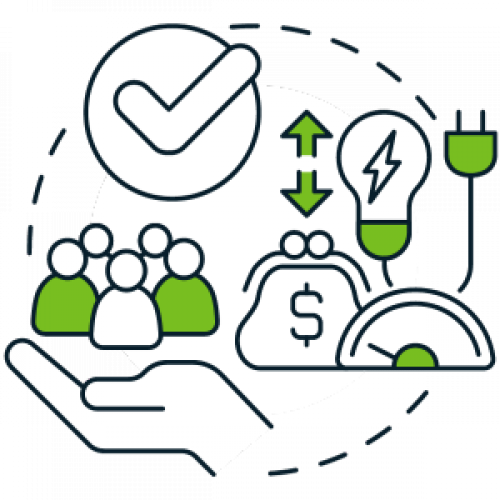How Auto Loans Work

How Do Auto Loans Work?
So, you need to get an auto loan. Purchasing a car, and auto financing generally, can seem like an exorbitant, never-ending carnival act — where one moment you have a new vehicle in your driveway and the next second all your money has vanished from your wallet.
Acquiring your dream car is now easier and more accessible than ever. With auto loans, you can obtain the vehicle of your dreams in only three easy steps - completing an application form with some simple questions, comparing different lenders to find one that best suits you, and having a loan approved so you can save money while driving away with the perfect set of wheels!
In addition to covering dealership or private seller costs, borrowers typically repay more than what they initially borrowed - which also grants lenders extra profit depending on credit scores.
Before you choose between auto loan offers, consider the toll it will take on your budget with auto loan rates, subsequent monthly payments and overall cost. It's important to remember that even if you have a low annual percentage rate (APR) for an extended-term car loan, the total interest paid could be more than with a shorter-term option boasting higher APR rates. Utilize a calculator to ensure you make an informed decision!
Calculating your monthly car payment is an essential step in the auto loan process. By using a calculator, you can estimate your monthly payments based on the loan amount, interest rate, and loan term. This can help you determine what you can afford and ensure you select an auto loan with a payment that fits your budget.
When comparing rates on auto loans, it's important to look beyond just the interest rate and consider other factors such as fees, loan terms, and any incentives that may be offered. Doing so can help you find the best rates on a current auto loan, and financing options on how to fund it.
Types of Auto Loans
If you're thinking about getting an auto loan, there are several options available to choose from that encompass lending solutions for both new and used cars. Here's a brief overview:

New Car Loan
Are you in the market for a new auto loan? You're spoiled with plenty of choices! Banks, credit unions, online lenders and even car manufacturers offer new vehicle loans to fit your needs. Even an electric vehicle!

Used Car Loan
If you're searching for a used auto loan, you can find them from various lenders. However, these institutions often set limits on the age and mileage of vehicles that they are willing to finance. Should you require a car with over 10 years in service or above 120,000 miles traveled - then it is likely that your best option is to acquire personal loans instead.

Private Party Car Loan
When purchasing a vehicle from an individual, instead of a dealership, you must apply for what is known as a private party auto loan. This type of loan may be difficult to come by; however they are still available via banks and credit unions.

Auto Refinance Loan
Are you seeking a more manageable car payment, an improved APR rate or cash-out? If so, auto refinancing has the power to fulfill your wishes.

Lease Buyout
At the conclusion of a vehicle lease, you have two options - either turn in the car or acquire it through lease buyout loans. A lease buyout loan gives you an alternative to paying for your leased car in full; instead, repayments can be made over time while allowing you to keep driving your automobile.
The Power of a Credit Union
When it comes to obtaining auto loans, a credit union can be a great option for many buyers. Unlike traditional banks, a credit union like Pathways are not-for-profit organizations that are owned by their members.
This means that they often offer lower rates on auto loans, flexible financing terms, as well as other financial products, such as checking accounts, credit cards, and personal loans. They are also up front with any affiliated costs and advertised rates.
This can result in significant savings over the life of the loan, especially if you're financing a larger purchase like a new or used car. In addition to lower rates, credit unions may also offer longer loan terms, which can help reduce your monthly payments and make your auto loan more affordable.
Another advantage of working with a credit union for your auto loan is that they may be more flexible when it comes to credit approval. While traditional banks typically have strict credit requirements and may deny your application if member credit scores are below a certain threshold, a credit union is often more willing to work with borrowers who have less-than-perfect credit. They may consider other factors in addition to your credit score, such as your income and employment history, when making a lending decision.
When considering a credit union for your auto loan, it's important to research their offerings and compare them with other lenders. While a credit union generally offers competitive rates and terms, they may have specific membership requirements or restrictions on who can apply for an auto loan. You'll also want to consider factors like the loan amount, loan term, and monthly payments to ensure that the loan fits within your budget.
In summary, choosing a credit union can be a powerful and convenient option when it comes to obtaining an auto loan. With generally lower auto loan rates relative to peers, longer loan terms, and flexible credit requirements, they offer a range of benefits that can help you save money and get the financing you need for your next car purchase.
Car Buying Service
If you're looking for a hassle-free car buying experience, a car buying service can be a great option. At Pathways, we offer TruCar. These services work as intermediaries between car dealerships and buyers, handling negotiations and paperwork on behalf of the buyer.
These services can also help buyers find the best deals and financing options, making the car buying process much more streamlined. When using a car buying service, it's important to do your research and choose a reputable provider with a good track record. Additionally, be sure to understand any fees associated with the service and factor them into the overall cost of the car.
What impact will a low credit score have on your ability to secure an car loan?
Boosting your credit score prior to applying for an auto loan could be immensely beneficial. According to Experian, the difference between the highest and lowest used-car APR in Q2 2022 was nearly 17 percentage points. Consider this: on a 5-year loan of $25,000 you could save around $12,700 over its lifetime if you applied with a higher credit rating– that's real money saved! A high credit score means less of your paycheck will go toward interest rates; it pays off in dividends!
Even if you have a limited credit history or made some errors in the past, it's possible to get car loans with bad credit. To give yourself an improved chance at receiving approval and potentially acquire a lower rate of interest, consider adding a cosigner or making a large down payment—or do both! Whatever your score may be, make sure that you compare multiple offers while searching for an auto loan as this can result in increased savings.
Frequently Asked Questions:
How do you get a car loan?
Unlocking access to the perfect car loan is simple when you follow these steps: Get informed by utilizing your credit score and report; decide what amount of money you are comfortable with borrowing, compare different lenders' offers, select one that best suits your needs and apply for a loan, and finally, submit all requested documents so that it can be reviewed as quickly as possible. Now, all you have to do to secure your auto loan is just wait for approval!
How do I get the best APR on a car loan?
Securing the most competitive annual percentage rate (APR) on your car loan requires a healthy credit spectrum.
Try these four tips:
- Raise your credit score and credit profile
- Make a substantial down payment (up front payment)
- Select a shorter duration of repayment terms and compare different lender offers
Excellent credit scores, of course, are one the best driving elements towards loan acceptance with competitive rate options. Doing this will allow you to find an ideal loan plan that suits all of your needs! It is also important to compare lenders.
Comparing lenders is a good idea! Is it a good idea to finance a car through a car dealership?
Financing a car through the dealership may be convenient, but it may not always be the best option. The interest rates offered by dealerships may be higher than what you can get from other lenders, which can result in higher overall costs.
Additionally, some dealerships may add on extra fees or charges to the purchase price, such as "dealer prep" fees, that can further increase the cost of financing through them. Even 'authorized dealerships' are guilty of this practice, depending on location.
It's important to shop around and compare rates and terms from different lenders - like a local neighborhood credit union! - to make sure you're getting the best deal possible.
What are some common loan terms and loan amounts for new car loans?
Loan terms for new car loans typically range from 36 to 72 months, although some lenders may offer longer or shorter terms depending on the borrower's creditworthiness. Loan amounts for new car loans can vary widely, but generally range from $10,000 to $50,000 or more.
Does the vehicle age affect my auto loan options?
Yes, the age of the vehicle can affect your auto loan options. Auto lenders may have different requirements and interest rates depending on the age of the vehicle you want to purchase. Here are a few things to keep in mind:
- New cars: If you're looking to purchase a new car, you may be able to get a lower interest rate and longer loan term compared to a used car. New cars are typically more expensive, but they also come with fewer maintenance issues and a manufacturer's warranty, which can give lenders more confidence in the loan.
- Used cars: If you're looking to purchase a used car, the age of the vehicle can impact your loan options. Some lenders may have restrictions on the maximum age of the car they will finance, while others may offer higher interest rates for older cars. Additionally, the loan term for a used car loan may be shorter than a new car loan.
- Vehicle age and loan term: The age of the vehicle can also impact the loan term you are offered. For example, if you're purchasing a new car, you may be able to get a loan term of up to 84 months. However, if you're purchasing a used car, the loan term may be shorter, such as 60 months or less.
- Loan amount: The loan amount for a used car may also be lower than a new car, which can impact your down payment and monthly payments.
It's important to consider the age of the vehicle when shopping for an auto loan. By doing your research and comparing loan options from different lenders, you can find a loan that fits your needs and budget, regardless of the vehicle's age.
Can you negotiate APR on a car?
Absolutely, you can haggle the APR on your car loan! Yet, how much is negotiable relies upon several criteria including credit score, the lender's regulations and current market forces.
What is a good interest rate for a car loan?
To determine the best interest rate for your car loan, an auto lender must consider multiple factors. This includes credit score, loan amount and term of repayment as well as any specific lender policies in play. As a rule of thumb, lower rates are more desirable with 3-4% being considered an excellent option.
Who has the best rates for car loans?
Several lenders offer competitive rates for car loans, including banks, credit unions, and online lenders. The best lender for you may depend on your credit score, income, loan amount, and other factors. LendingTree allows you to compare offers from multiple lenders to find the best rates and terms for your needs.
How long does it take to get loan approval for an auto loan?
The time it takes can vary depending on the lender and the complexity of the loan application. In some cases, you may be able to receive loan approval within minutes of submitting your application. However, in other cases, it may take several days or even weeks to receive a decision.
How do I calculate my estimated monthly payment?
To calculate your monthly payment, you will need to know the loan amount, interest rate, and loan term. You can use an auto loan calculator to quickly and easily calculate your monthly payment based on these factors.
What happens if I can't make my monthly auto loan payment?
If you are unable to make your monthly payment, it's important to contact your lender as soon as possible to discuss your options.
Depending on your circumstances, your lender may be able to offer you a deferment or forbearance, modify your loan terms, or work out a payment plan that fits your budget. However, it's important to act quickly to avoid defaulting on your loan and damaging your credit score.
Conclusion
In summary, obtaining auto loans and financing your next vehicle purchase can be a complex process. However, by considering options such as a credit union membership, calculating your monthly car payment, including credit history and credit scores, and utilizing a car buying service, you can simplify the process and find the best auto loan rates and financing options for your needs. By doing your research and understanding your options, you can ensure a stress-free car buying experience and enjoy your new car with confidence.



























